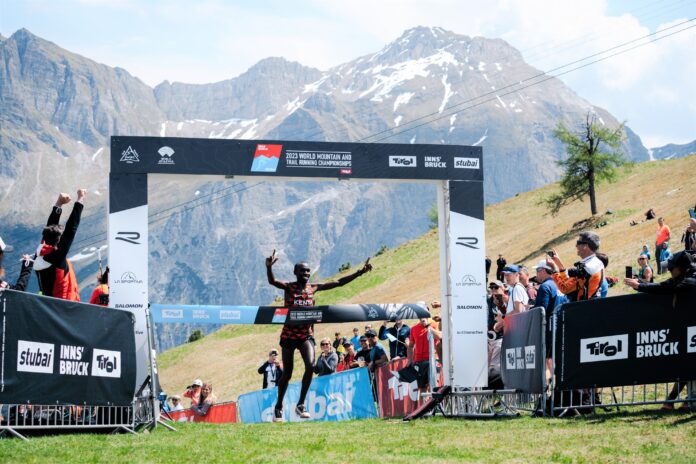
The curtain came down on the second World Mountain and Trail Running Championship in Innsbruck, Austria, over the weekend, an event which took the sport to an unprecedented level of competitiveness.

German athlete, Ida-Sophie Hegemann is dwarfed by some of Austria’s highest mountains in one of the toughest championship 86km races. Photo – Roast Media
At the end of four days of extreme racing over some of the steepest and longest mountain climbs imaginable, France was named as the leading-performing country over all four senior events at the championship, followed by Italy and the USA. 1500 athletes took part from 66 countries and all habitable continents.
Africa competed strongly, with Kenyan and Ugandan athletes bagging top positions in the two mountain running events in which they competed seriously and South Africa running consistently, if not spectacularly, in all the senior events on offer.
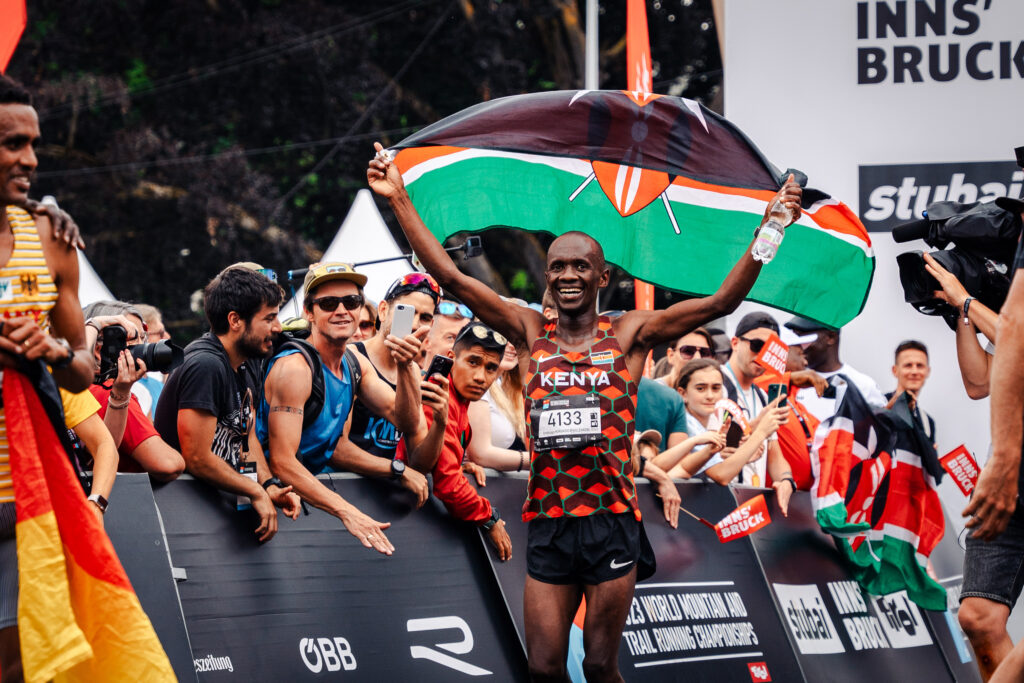
Kenyan Philemon Kiriago celebrates his silver medal in the 15km Mountain Classic race on the last day of the Championship. Photo – Roast Media
While the logistical challenges of hosting an event centred in two hubs separated by 35km were evident, the local organizing committee mostly rose to the occasion and delivered an event which will long live in the memories of those who competed. The elements, notoriously fickle in June in Austria’s Tyrolian mountains, mostly played along, with the majority of racing taking place in cool, partially sunny conditions.
Only at the tail-end of the 45km ‘Short Trail’, when a cloud-burst forced the race to be abandoned and the last fifty participants to be taken off the mountain before they could finish, and the latter stages of the 86km ‘Long Trail’, when the thirty-degree plus temperatures made the going tough, were conditions sub-optimal. But trail is not track and field, and adverse conditions are as much a part of the sport as the challenging terrain.
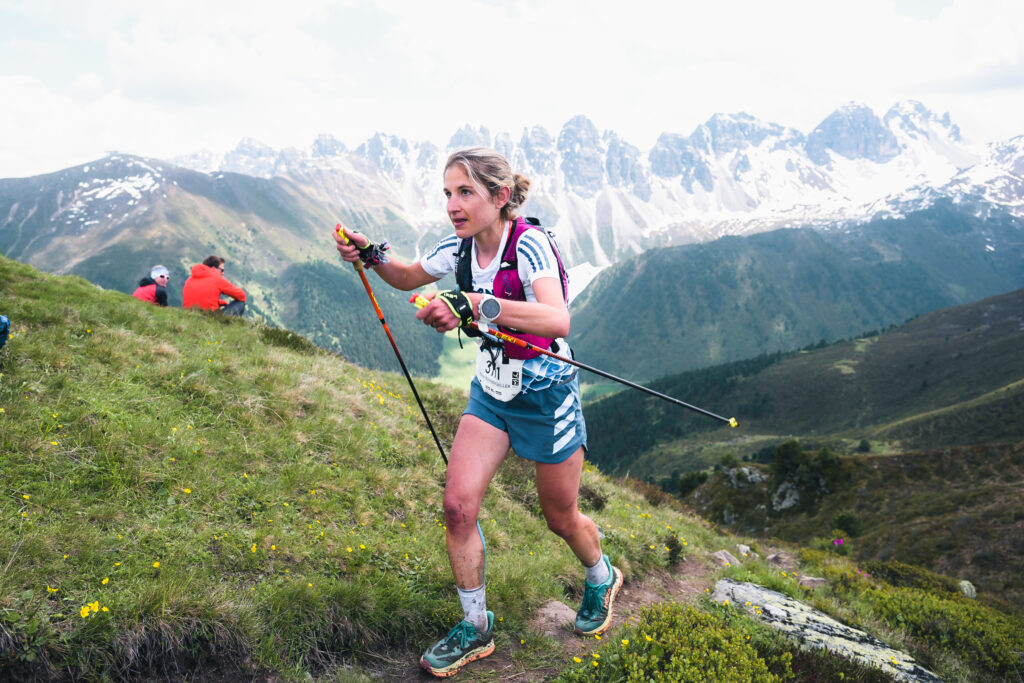
Manon Bohard-Caillerbon high on the slopes of Grieskogel Peak during the Long Trail 85km. Photo – Roast-Media
An impressive aspect of the championship was the strong emphasis on sustainability, with attention paid to limiting its carbon footprint through the use of public transport and shuttles ahead of private rentals, life-cycle approach to materials and a no-tolerance approach to littering.
“Here in the beautiful Tyrol, we are working to live up to our sustainability claim ‘Leave no Trace’ and restore all that we have found to its original state,” said event CEO, Alexander Pittl. Once again, I would like to thank you all for giving sustainability a high priority in your thoughts and actions.”
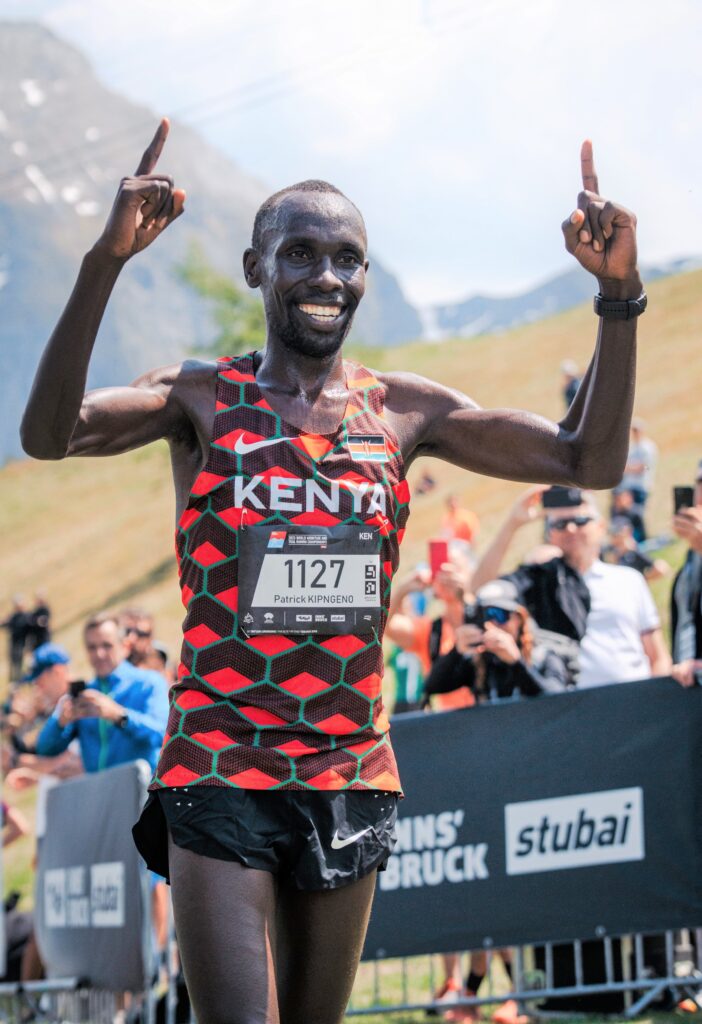
Kenyan Patrick Kipngeno celebrates his victory at the 2050m high Elfer Hause in the Vertical Challenge race. Photo – Roast Media
But in the end, it was primarily about trail running at speed, and highlights were provided by impressive feats of speed, dexterity and endurance by the newly-crowned world champions.
Kenya’s Patrick Kipngeno was a cut above the rest in the Vertical Challenge, running comfortably up the steepest slope of the Elfer Mountain when others were crawling on all fours, while ‘local hero’, Austrian Andrea Mayr, was a popular winner in the same event.
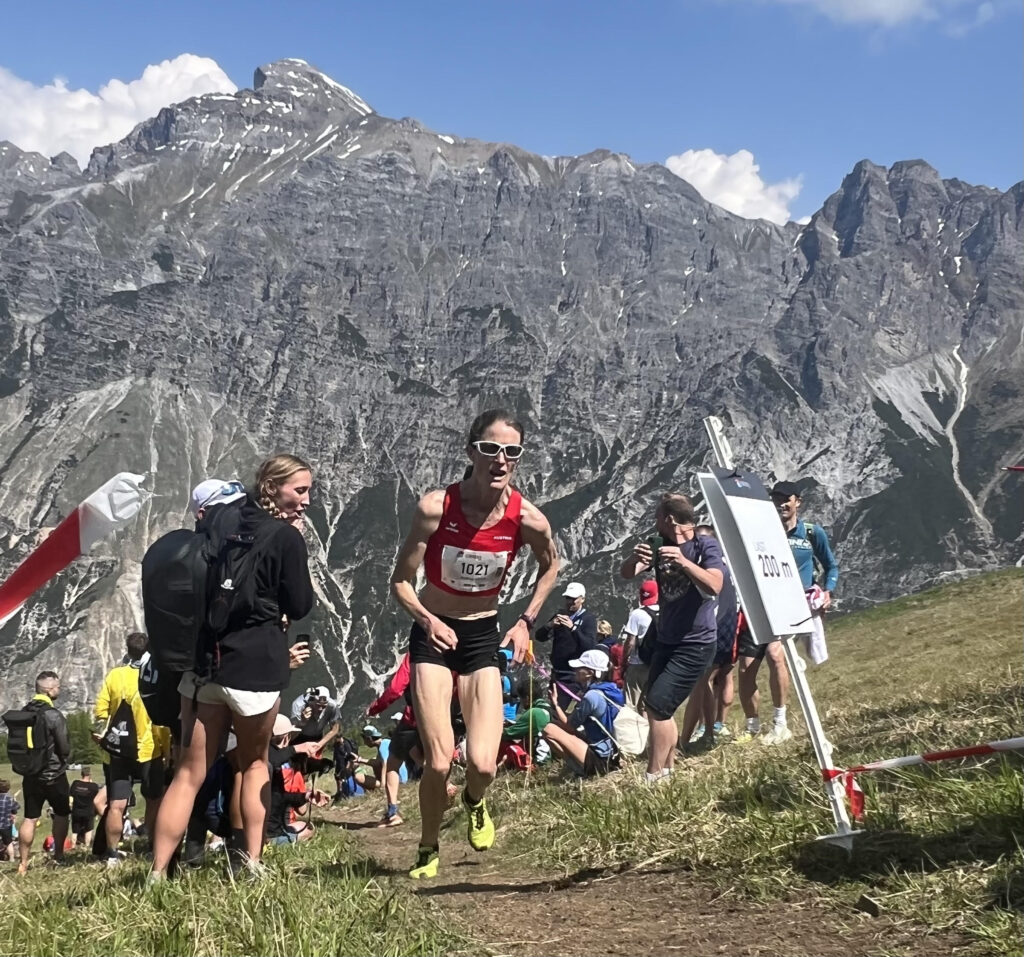
Austrian Andrea Mayr just 200m from victory in the Vertical Challenge race on the Elfer Mountains. Photo – Stephen Granger
In the curiously-named ‘Short Trail’ race over 45km, Norwegian’s Stian Angermund, who like Kipngeno retained his title won in Thailand last year, showed close rival, British athlete Thomas Roach a clean pair of heels on the final slippery descent, while surprise package, the young French athlete, Clementine Geoffray, overtook the more favoured, Judith Wyder of Switzerland, in the latter stages to take the women’s title.
Former Ultra-trail Cape Town winner, Andreas Reiterer of Italy, looked confident leading the ‘Long Trail’ 86km race, which included a lung-searing 6500m of vertical ascent, through half way but he reckoned without the unheralded French athlete, Benjamin Roubiol, whose strong second half relegated Reiterer to the silver medal.
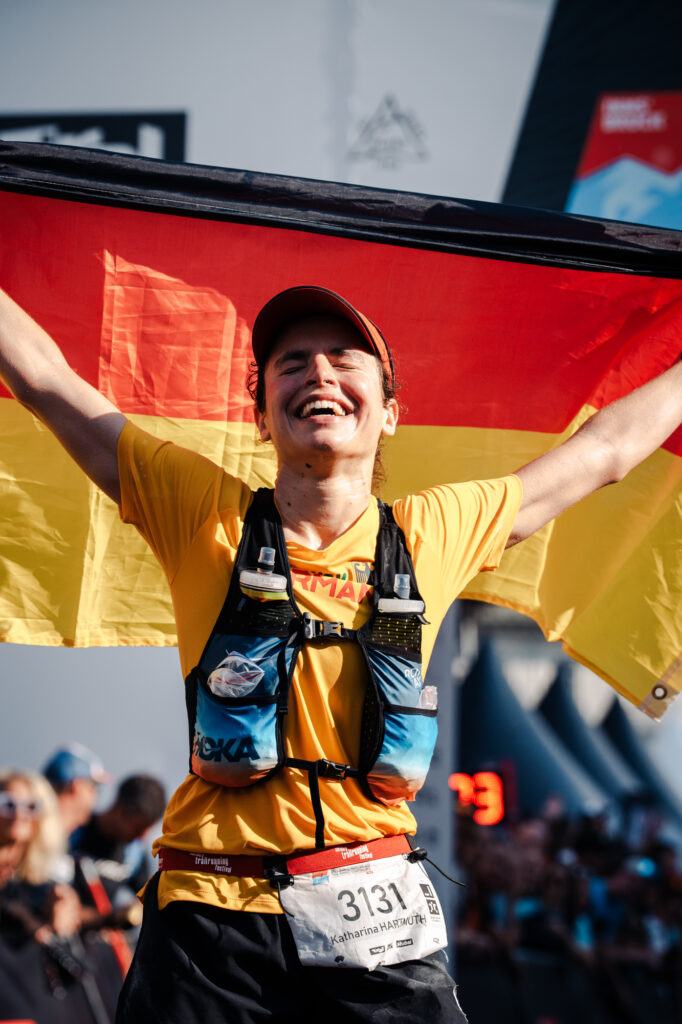
Germany’s Katharina Hartmuth shows her delight at taking the silver medal behind Marion del Espierre. Photo – Roast-Media
Even Marion del Espierre’s husband never expected his spouse to win gold in the women’s Long Trail competition. “It’s really surprising she’s just taken the lead,” he remarked 20km from the finish, as Del Espierre surged past early leader, Germany’s Katherina Hartmuth. “I’m not expecting her to hold on till the finish – her training has not been so good.” But she did, contributing solidly to her country’s overall award.
Africans were again to the fore in the final event of the championship, the 15,5km Mountain Classic. Running the testing two-loop course at the speed of lightning, Ugandan Leonard Chemutai held off Kenya’s Philemon Kiriago to claim the title, with James Kirui and Hosea Chemutai bringing Uganda further glory by taking gold and silver in the men’s junior 6km race.
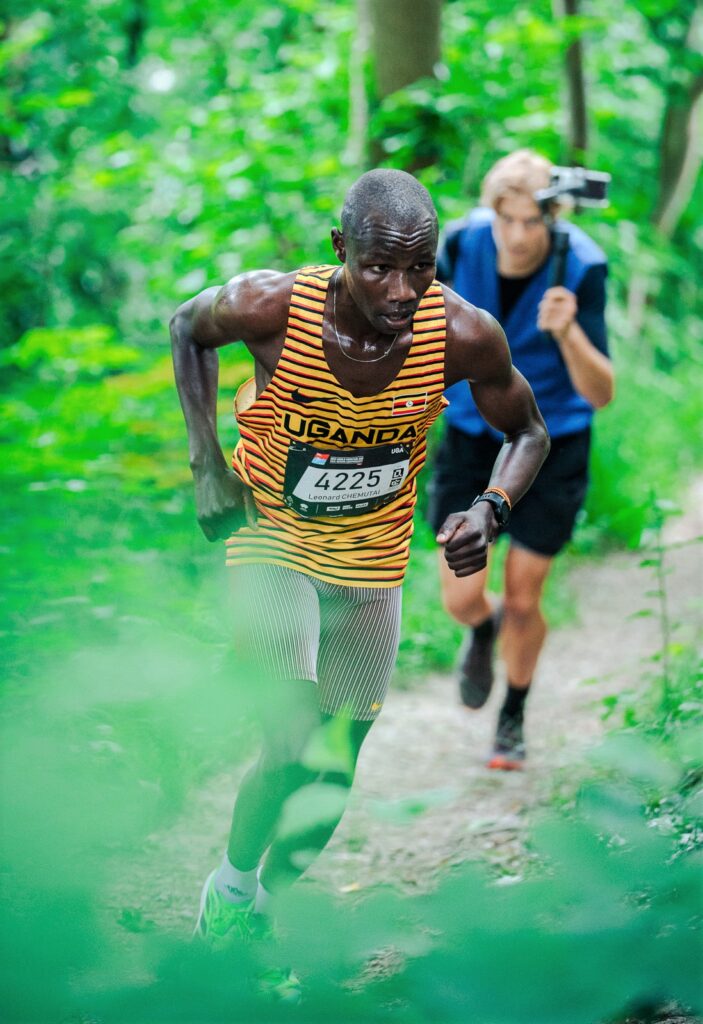
Leonard Chemutai shows the determination which took him to gold in the 15km Mountain Classic. Photo – Roast Media
American Grayson Murphy was impressive in winning the women’s race ahead of dare-devil Swede, Tove Alexandersson, with Kenya’s Joyce Muthoni third, and plans to use her mountain classic title to launch her career in the sought-after Golden Trail Series later this year.
Few questioned French commitment to the cause which earned them recognition as overall champions, their win built on the strong foundation of title wins by Geoffray, Roubiol and Del Espierre, with Reiterer’s silver in the 86km and Luca del Pero’s bronze in the 45km leading the Italians to second overall.
Kenya’s Kipngeno’s gold in the vertical challenge, silvers from Philaries Kisang in the same event and Kiriago in the mountain classic and bronze medals from Muthoni in the mountain classic and Josphat Kiprotich in the vertical challenge were impressive but their minimal participation in the longer trail races saw them rated 17th overall, ahead of South Africa at 24th, who raced all senior events without impacting on the medals’ table.
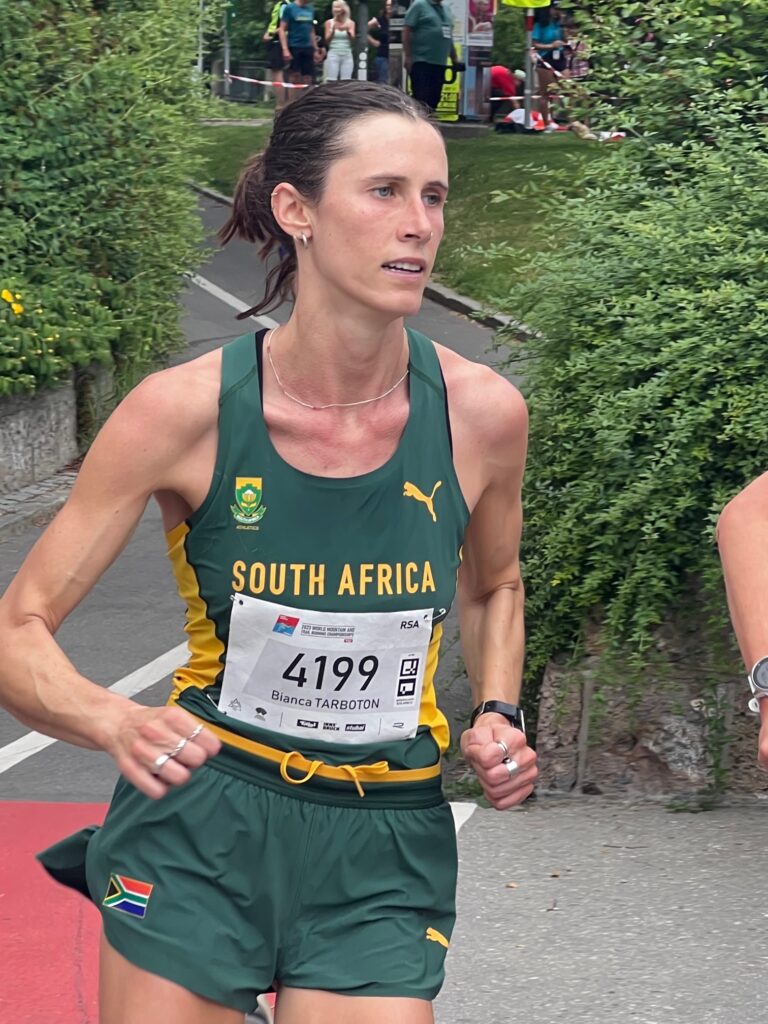
Bianca Tarboton in action in the Mountain Classic 15km – highest place South African athlete in the Championship. Photo – Stephen Granger
Bianca Tarboton (34th in the mountain classic), Landie Greyling (37th in the Short Trail), Kane Reilly (38th in the vertical challenge), Sipho Mbanjwa (41st in the mountain classic) and Daniel Claassen (44th in the Long Trail) were South Africa’s leading athletes in intensely competitive races, where a top fifty position – the first one third of a field of the world’s best trail athletes – represented top-class racing.
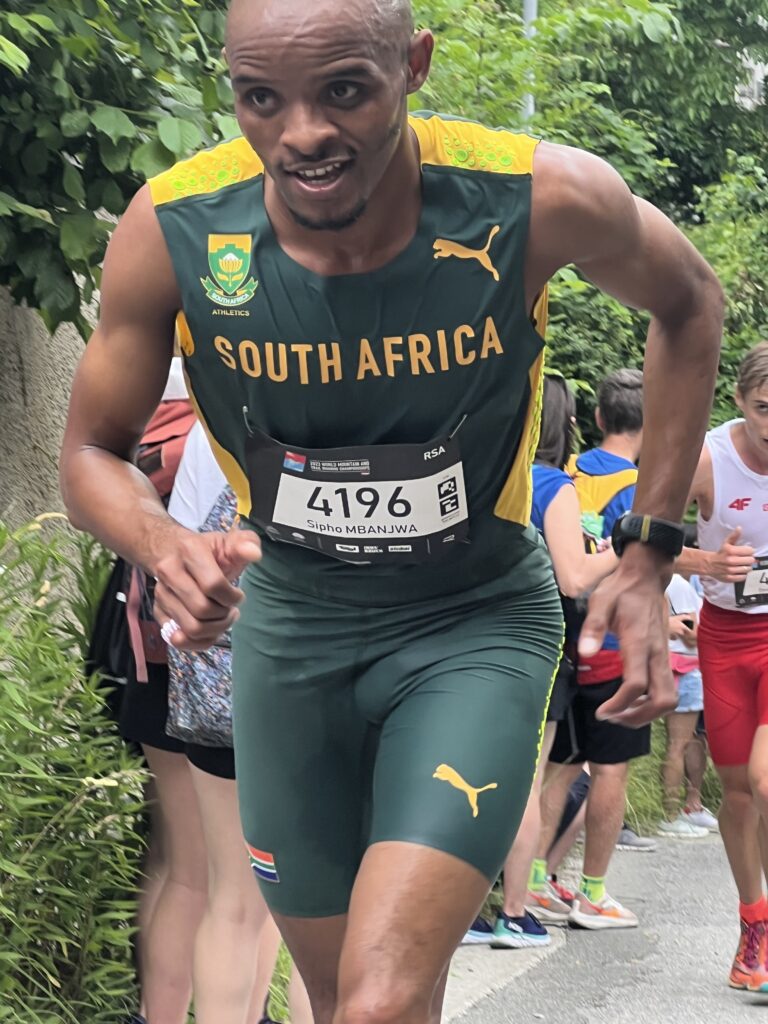
South Africa’s Sipho Mbanjwa in action in the Mountain Classic. Photo – Stephen Granger
Sadly, the hopes of three of South Africa’s athletes best-placed to challenge for top ten positions and possibly medals, Toni McCann, Meg Mackenzie and Mbuleli Mathanga, were extinguished by injuries. All three will be strongly motivated to deliver in 2025, when the next championship will be held in the Spanish Pyrenees Mountains.
As spectacle, there is little doubt that this new edition to the World Athletics championship series is one of the most attractive. With the mountain and trail championship likely to attract athletes from a hundred countries before the end of the decade, it is also highly marketable, in particular from an adventure and destination tourism perspective.
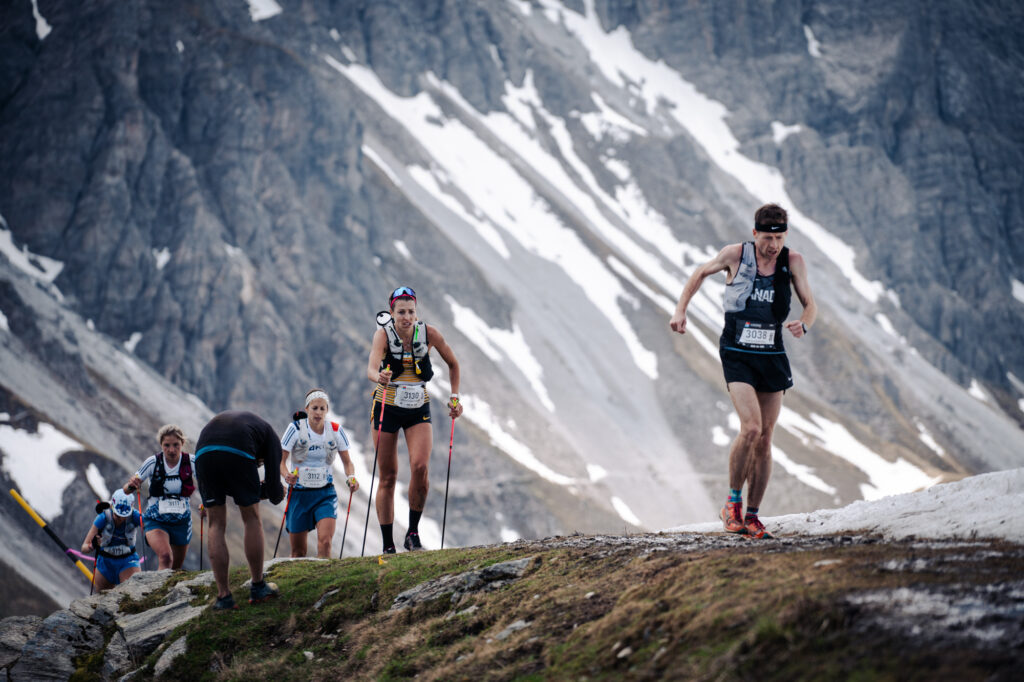
As a spectacle, the World Mountain and Trail Running Championships, could not be beaten. Photo – Roast Media
Africa could benefit from hosting the championship, both economically and in growing the sport on the continent. Could an African bid compete with European destinations? “Our president, Sebastian Coe, has emphasized the importance of staging one of our championships in Africa in the near future,” said World Athletics Head of Running (Competitions and Events) Alessio Punzi.
“We would love to receive a bid from an established trail-running destination such as Cape Town for 2027 or 2029.”


